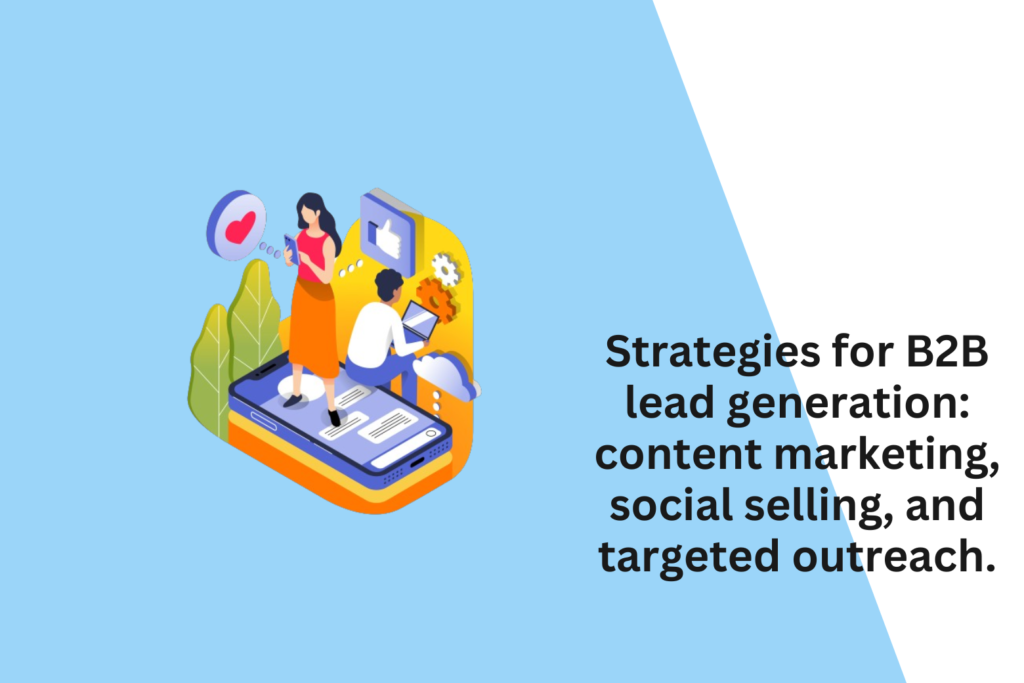
B2B lead generation is a crucial aspect of business success, and employing effective strategies is key to attracting and converting potential clients. Here are strategies for B2B lead generation, focusing on content marketing, social selling, and targeted outreach:
1. Content Marketing:
Create High-Quality Content:
- Develop content that addresses the pain points and challenges of your target audience. This can include blog posts, whitepapers, e-books, and case studies that provide valuable insights and solutions.
Optimize for Search Engines (SEO):
- Implement SEO best practices to ensure that your content is discoverable by your target audience. Use relevant keywords, optimize meta tags, and create content that aligns with user search intent.
Offer Gated Content:
- Create premium content, such as in-depth reports or industry-specific insights, and gate it behind a form. This allows you to capture contact information from prospects interested in accessing valuable resources.
Leverage Webinars and Virtual Events:
- Host webinars and virtual events on topics relevant to your industry. These platforms provide opportunities to showcase expertise, engage with your audience, and collect leads from event registrations.
Email Marketing Campaigns:
- Use email marketing to nurture leads. Send targeted and personalized content to your email subscribers, guiding them through the buyer’s journey and offering relevant information at each stage.
2. Social Selling:
Build a Strong LinkedIn Presence:
- Optimize your LinkedIn profile and company page. Share relevant content, participate in industry discussions, and connect with potential leads. LinkedIn is a powerful platform for B2B social selling.
Engage in Thought Leadership:
- Establish yourself and your brand as a thought leader in your industry. Share insights, comment on relevant discussions, and provide valuable content that positions your business as an authority.
Use Social Listening:
- Monitor social media platforms for discussions related to your industry and services. Engage in conversations, answer questions, and provide solutions. Social listening helps you identify and connect with potential leads.
Direct Messaging and InMail:
- Utilize direct messaging on platforms like LinkedIn to initiate conversations with potential leads. Craft personalized messages that demonstrate an understanding of their needs and how your solution can provide value.
Employee Advocacy Programs:
- Encourage your team to participate in social selling efforts. Employee advocacy programs empower your workforce to share content, engage with prospects, and expand the reach of your B2B brand.
3. Targeted Outreach:
Define Ideal Customer Profiles (ICPs):
- Clearly define your ideal customer profiles based on industry, company size, and other relevant criteria. This ensures that your outreach efforts are focused on prospects most likely to convert.
Use Account-Based Marketing (ABM):
- Implement account-based marketing strategies to target specific companies or accounts. Tailor your outreach efforts to address the unique needs and challenges of each targeted account.
Personalized Email Campaigns:
- Craft personalized email campaigns that speak directly to the pain points and goals of your target audience. Use segmentation to send targeted messages and increase the relevance of your outreach.
Cold Calling and Direct Outreach:
- Combine digital efforts with traditional methods like cold calling. Direct outreach through phone calls or personalized messages can be effective when done strategically and backed by relevant information.
Networking at Industry Events:
- Attend industry events, both virtual and in-person, to network with potential leads. Establish connections, exchange contact information, and follow up with personalized messages to continue the conversation.
Utilize Customer Referrals:
- Leverage satisfied customers for referrals. A recommendation from an existing client can significantly enhance your credibility and increase the likelihood of generating leads from similar businesses.
Remember to track and analyze the performance of your lead generation strategies using relevant metrics. This data-driven approach helps refine your strategies over time, ensuring that you consistently attract and convert high-quality B2B leads.



